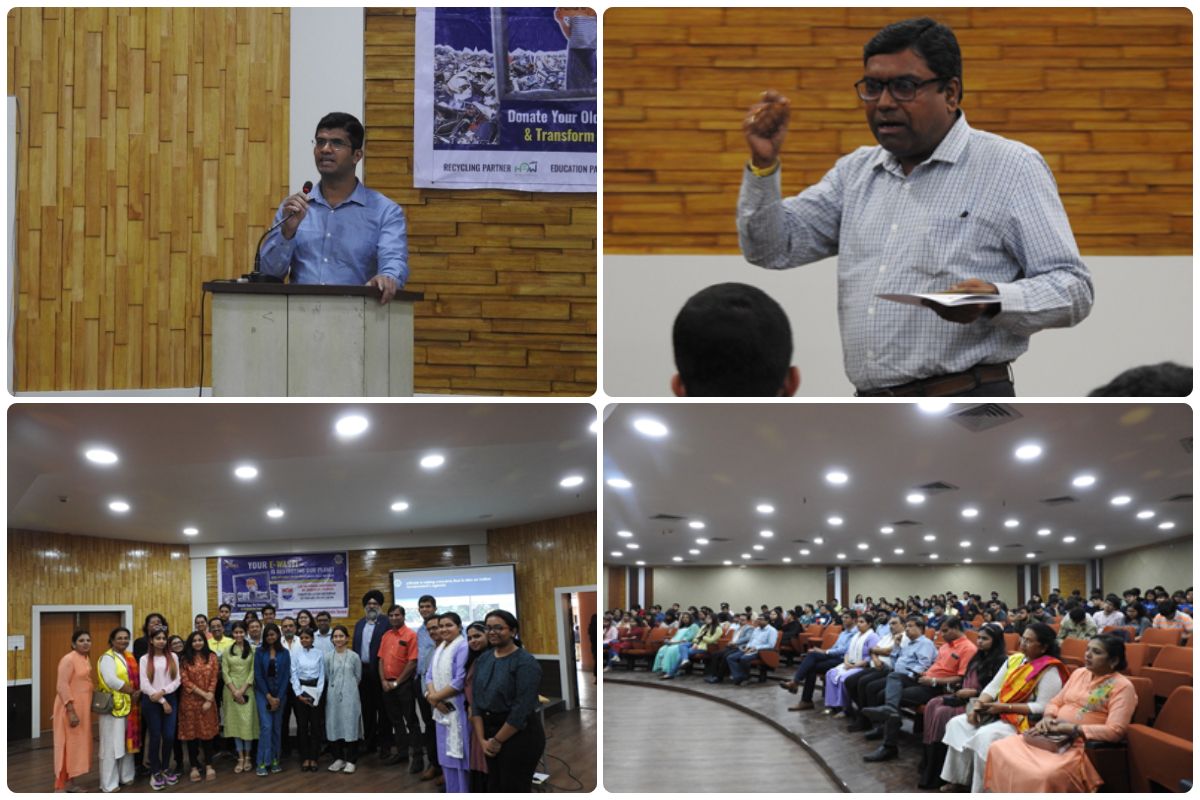Date: 01.02.2023
Event Name: E-Waste Seminar
Venue: WBNUJS
Electronic waste, commonly known as e-waste, is a growing environmental problem that poses a threat to the health of both humans and the environment. It refers to discarded electronic devices, such as computers, mobile phones, televisions, refrigerators, and other electronic appliances, that have reached the end of their useful lives. The rapid growth of the electronics industry, coupled with the relatively short lifespan of electronic devices, has led to a substantial increase in e-waste. E-waste contains valuable materials such as gold, silver, and copper that can be recovered and reused. However, it also contains toxic substances, including lead, cadmium, mercury, and other hazardous materials that can cause environmental pollution and pose a risk to human health. Improper disposal of e-waste can lead to soil and water contamination, air pollution, and exposure to toxic substances, which can have negative impacts on the health of humans and wildlife. The majority of e-waste ends up in landfills or is incinerated, which can release harmful substances into the air, soil, and water. However, there are safer and more sustainable ways to dispose of e-waste. One of the most effective methods is to recycle e-waste. Recycling can help recover valuable materials and reduce the amount of waste sent to landfills. Many countries have implemented laws and regulations for the disposal and recycling of e-waste. The European Union, for example, has established the Waste Electrical and Electronic Equipment (WEEE) directive, which sets targets for the collection, recovery, and recycling of e-waste. Similarly, the United States has enacted the Electronic Waste Recycling Act, which requires manufacturers to take back and recycle electronic devices. There are also several private initiatives and organizations that are working towards reducing e-waste. These organizations collect and refurbish electronic devices and donate them to communities in need. Additionally, some companies have developed innovative ways to recycle e-waste, such as using microorganisms to extract metals from electronic waste. E-waste is a significant environmental issue that requires urgent attention. For this reason, the Nature Committee in collaboration with Lions Club International decided to organise the E-Waste Seminar for the General Body.
The E-Waste Seminar was held on February 1, 2023, from 3:00 p.m. to 4:00 p.m. at the West Bengal National University of Juridical Sciences. The seminar was organised by the Nature Committee in collaboration with Lions Club International. Lions Club International is one of the largest service organisations that has launched an e-waste collection and community education campaign to raise awareness of the harmful effects of e-waste on the environment and the importance of effective management. The seminar’s goal was to discuss the importance of recycling e-waste. Over 100 people attended the event, including NUJS faculty, students, and Lions Club members. In pursuance of the E-waste Seminar, an e-waste collection drive and door-to-door collection were also held at the university campus where the general body, staff, faculty and other university members were encouraged to ‘Donate or Dump’ their e-waste, which turned out into an effective initiative.
The keynote speeches were followed by a Q&A session with the audience, where the speakers answered various questions related to their work in the field of e-waste management.
The “E-waste” seminar was a success, providing useful information about e-waste management. The keynote speeches and discussions were informative, interactive, and thought-provoking, with overwhelmingly positive feedback from attendees. The seminar was successfully conducted by faculty coordinator Dr. MP Chengappa and moderator Saheli Chakraborty. The committee is grateful to the Vice President of Lions Club International AP Singh , Dr. Arup Kumar Poddar and other dignitaries for providing useful insights on the benefit of recycling e-waste. The committee also thanks General Body for active and interactive participation.










 Users Today : 479
Users Today : 479 Users Last 7 days : 4484
Users Last 7 days : 4484 Total views : 1089948
Total views : 1089948